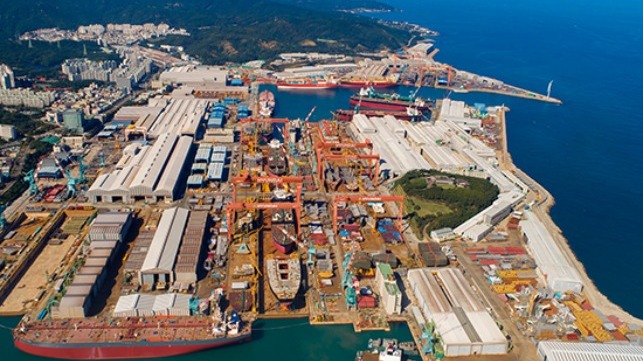Korean Shipbuilder KSOE Partners with Doosan for Fuel Cell Development

To expand its position in the emerging alternative fuel sector, Korea Shipbuilding & Offshore Engineering has signed a memorandum of understanding with South Korea’s Doosan Fuel Cell Company, which is developing stationary fuel cells for the Korean power industry. The two companies will work together on the research and development of a solid oxide fuel cell for maritime and offshore applications.
Using a megawatt-class SOFC system, KSOE’s goal is to preemptively develop fuel cells for ships to enhance its competitive advantage in the future of shipbuilding. They will take the lead in designing the fuel cell arrangements specific to the marine environment and developing ship-linked system control technology.
Doosan, which licenses proprietary SOFC stack technology from the UK’s Ceres Power, will lead the design and manufacture of the system for ships. They will also be evaluating stability and developing system control technology.
Sang-jin Moon, Managing Director of Doosan Fuel Cell, said, “The fuel cell for ships can replace not only the existing power generation engine but also the main propulsion engine, and through an Energy Management System, energy efficiency can be improved.”
In addition to the reduction of emissions from the ships, the companies believe that marine fuel cells can be developed as a high-efficiency power generation source that can increase power generation by approximately 40 percent over existing marine engines.
Founded after its spin-off from Doosan Fuel Cell BG in October 2019, Doosan has been developing stationary fuel cells and is workings with Korea’s Ministry of Trade, Industry and Energy with the goal of domestic mass production of a SOFC system starting in 2024. Last October, Doosan announced a strategic collaboration and license agreements with Ceres which has been developing fuel cell and electrochemical technology. As part of the agreement, the companies committed to building a 50MW facility in South Korea for the mass manufacture under license of Ceres’ fuel cell stacks.

that matters most
Get the latest maritime news delivered to your inbox daily.
Marine applications could represent a significant expansion of Doosan’s future SOFC business, in addition to its current stationary power market. Shipping accounts for over two percent of global greenhouse gas emissions and SOFC is considered to be one of the most promising clean energy technologies to achieve the maritime industry’s goal of a 50 percent reduction in its emissions. Doosan previously entered into a separate agreement with the Singapore-based tanker operator Navig8 to cooperate in the development of a fuel cell solution for applications in the maritime sector. The companies said they would likely start with LNG as the fuel for the first phase of their project incorporating ammonia and hydrogen as fuels as the technologies developed.
In a separate but related announcement, Ceres Power reported that it raised $252 million in a share placement and subscription to accelerate its investment in the development and potential commercialization of its solid-oxide electrolysis technology. Ceres said the funding would also be used in supporting its manufacturing partners as they scale up to initial mass-market launches in 2024.
